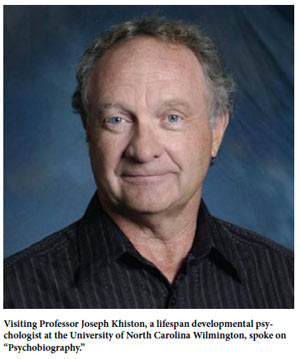 |
 |
 |
|
August 2010
|

In April 2010, the Psychology Seminar Series was launched with two student presentations on the theme Emotions and Cognition. MPhil candidate, Sideeka Ali, raised methodological concerns, access to information and direction to resources in order to facilitate data collection. Her research in developmental psychology is titled, “Emotion Experience and Emotional Regulation: How Are They Related to Relationship Satisfaction across Age and Gender?”
At the second seminar in May, visiting Professor Joseph Khiston, a lifespan developmental psychologist at the University of North Carolina Wilmington, spoke on “Psychobiography.” He began with a distinction between traditional biography which is focused on telling the story of a life, versus psychobiography which is about making sense of a person’s life. Psychobiography, he explained, employs Erik Erikson’s epigenetic principle which states that we develop through a predetermined unfolding of our personalities. Our progress through life is therefore dependant on our successes and failures throughout our developmental process, from childhood to adulthood. These events coupled with our genetics give explanation to our life events and make us who we are.
Among those who attended, a history student saw relevance of this enlightening topic to the area of psycho history by using the psychobiographical approach to examine the narratives of African slaves in the Caribbean. Students from the Liberal Arts Dept. noted that psychobiography can be used to study cultural icons in Trinidad and Tobago. Another student noted that while psychobiographical sketches have been done here at the university, there was no formal recognition that the work was psychobiography. These insights gleaned from students of varying disciplines demonstrate that there is a particular richness derived from the cross fertilization of ideas, the meeting of minds from diverse disciplines with varying perspectives. In the academic year 2010-2011, topics at the Psychology Seminar Series will range from research in psychology, to career opportunities and perspectives on further academic pursuits in psychology. Various approaches will be used; some will be in the form of presentations by students, lecturers and visiting professors as well as panel discussions. Panelists will be drawn from students, lecturers, successful MPhil and PhD candidates and also from among psychologists. Students and staff are invited to attend and participate. |

 The Psychology Seminar Series is an initiative undertaken by graduate students from the Behavioural Sciences Department, Rosana Yearwood and Jannel Philip, supported by supervisor, Dr. Derek Chadee, and lecturers of the Psychology Unit. The series was designed to create a forum for a meeting of minds in a space which generates healthy debate. A key feature of the series is its flexible format, which facilitates students’ and presenters’ particular needs or agendas. It also prepares students for seminar presentations in fulfillment of their MPhil or PhD requirements, by offering a supportive environment, in which they can stand and confidently respond to feedback.
The Psychology Seminar Series is an initiative undertaken by graduate students from the Behavioural Sciences Department, Rosana Yearwood and Jannel Philip, supported by supervisor, Dr. Derek Chadee, and lecturers of the Psychology Unit. The series was designed to create a forum for a meeting of minds in a space which generates healthy debate. A key feature of the series is its flexible format, which facilitates students’ and presenters’ particular needs or agendas. It also prepares students for seminar presentations in fulfillment of their MPhil or PhD requirements, by offering a supportive environment, in which they can stand and confidently respond to feedback.  In keeping with the theme, PhD candidate Jannel Philip presented theoretical arguments on the bidirectional aspect of emotions/cognition relationship and the effects on behaviour from a social psychological perspective. Her presentation, “Feeling or Cognition? Cognitions and Emotions as Predictors of Prosocial Behaviour,” questioned the role of emotions and cognition in predicting prosocial behaviour. She suggested that both feelings and cognitions have a significant impact on prosocial behaviour and the prominence of one over the other depends on many social psychological factors.
In keeping with the theme, PhD candidate Jannel Philip presented theoretical arguments on the bidirectional aspect of emotions/cognition relationship and the effects on behaviour from a social psychological perspective. Her presentation, “Feeling or Cognition? Cognitions and Emotions as Predictors of Prosocial Behaviour,” questioned the role of emotions and cognition in predicting prosocial behaviour. She suggested that both feelings and cognitions have a significant impact on prosocial behaviour and the prominence of one over the other depends on many social psychological factors.  Professor Kishton further cited use of this principle in Erickson’s psychobiographies of key historical figures such as Mahatma Gandhi (1969), Martin Luther (1958), the protestant reformer, and even a fictional film character Dr. Isak Borg, from Ingmar Bergman’s film, Wild Strawberries. With video clips and excerpts from his work on some personalities, Professor Kishton demonstrated the application and usefulness of Psychobiography.
Professor Kishton further cited use of this principle in Erickson’s psychobiographies of key historical figures such as Mahatma Gandhi (1969), Martin Luther (1958), the protestant reformer, and even a fictional film character Dr. Isak Borg, from Ingmar Bergman’s film, Wild Strawberries. With video clips and excerpts from his work on some personalities, Professor Kishton demonstrated the application and usefulness of Psychobiography.